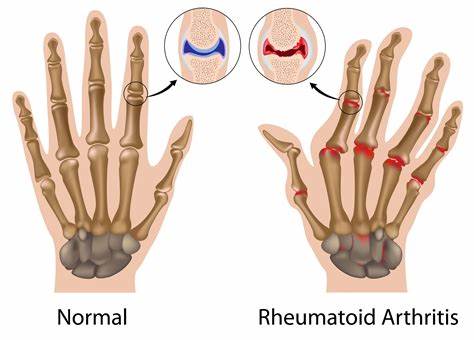The nurse is assisting with the care of a patient with rheumatoid arthritis (RA). What should the nurse consider when providing care?
Injury and age are the greatest contributors to disease development.
Acutely inflamed joints will respond best to heat therapy.
It is essential to monitor all body systems for effects of the disease.
Exercise is poorly tolerated and frequent rest is needed.
The Correct Answer is C
Choice A reason: While injury and age can be risk factors, they are not the greatest contributors to RA, which is an autoimmune disease.
Choice B reason: Heat therapy can help relieve pain in some cases, but it is not always the best response for acutely inflamed joints; cold therapy is often recommended to reduce inflammation.
Choice C reason: RA can affect multiple body systems beyond the joints, including the cardiovascular and respiratory systems, so it is essential to monitor all body systems.
Choice D reason: Exercise is actually beneficial for patients with RA to maintain joint function and muscle strength; rest is important, but should be balanced with physical activity.

Nursing Test Bank
Naxlex Comprehensive Predictor Exams
Related Questions
Correct Answer is C
Explanation
Choice A reason: Conversion typically refers to the expression of psychological distress through physical symptoms, which is not the case here.
Choice B reason: Undoing is a defense mechanism where a person tries to 'undo' an unhealthy thought or behavior with a healthier one, which does not apply to Michael's situation.
Choice C reason: Compensation is a defense mechanism where a person overachieves in one area to make up for deficiencies in another, which describes Michael's actions.
Choice D reason: Sublimation involves channeling unacceptable impulses into socially acceptable activities, which is not explicitly indicated in this scenario.
Correct Answer is C
Explanation
Choice A reason: Direct communication with the surgeon can provide the patient with reassurance and specific information about the surgery, which may alleviate fears.
Choice B reason: Offering spiritual support may be helpful, but it does not directly address the patient's concern about the surgery itself.
Choice C reason: Providing statistics may be reassuring, but it may not fully address the patient's individual fears.
Choice D reason: Recommending analgesics only addresses pain management and not the patient's expressed fear regarding the surgery.
Whether you are a student looking to ace your exams or a practicing nurse seeking to enhance your expertise , our nursing education contents will empower you with the confidence and competence to make a difference in the lives of patients and become a respected leader in the healthcare field.
Visit Naxlex, invest in your future and unlock endless possibilities with our unparalleled nursing education contents today
Report Wrong Answer on the Current Question
Do you disagree with the answer? If yes, what is your expected answer? Explain.
Kindly be descriptive with the issue you are facing.
